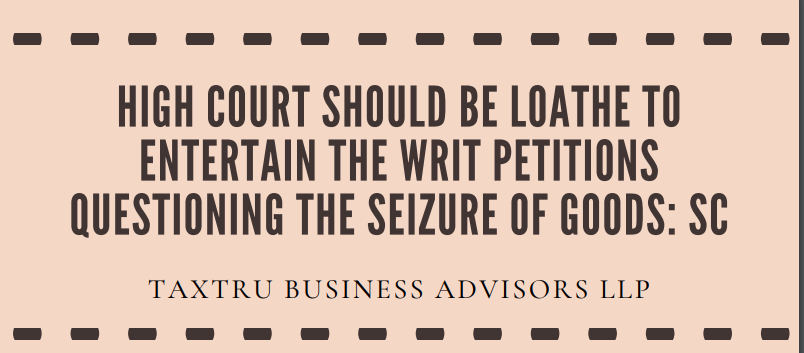High Court Should Be Loathe To Entertain The Writ Petitions Questioning The Seizure of Goods: SC
High Court Should Be Loathe To Entertain The Writ Petitions Questioning The Seizure of Goods: SC
What is it about?
Interim orders were passed by the Allahabad High Court directing the GST authority to release the seized goods on deposit of security or on furnishing of indemnity bond equal to tax and penalty to the satisfaction of the Assessing Authority against which appeal was filed before SC.
Observations of the SC
- The Apex Court held that in all such cases, HC should have referred assessees to Appropriate Authority for complying with the procedure prescribed under the GST Act.
- Section 67 CGST Act read with Rule 140/141 of the CGST Rules contains a complete code for release (including provisional release) of seized goods.
- Therefore, the orders passed by the High Court are held contrary to the provisions prescribed and such order would not be given effect, to be processed by the authorities afresh in accordance with the law.
Worth mentioning citation from the Judgement:-
“There is no reason why any other indulgence need be shown to the assessees, who happen to be the owners of the seized goods. They must take recourse to the mechanism already provided for in the Act and the Rules for release, on a provisional basis, upon execution of a bond and furnishing of security, in such manner and of such quantum (even up to the total value of goods involved), respectively, as may be prescribed or on payment of applicable taxes, interest, and penalty payable, as the case may be, as predicted in Section 67 (6) of the Act. In the interim orders passed by the High Court which are the subject matter of assail before this Court, the High Court has erroneously extricated the assessees concerned from paying the applicable tax amount in cash, which is contrary to the said provision.”
My View
The same view has been reiterated in below-mentioned judgements by different High Courts:-
- M/s R K Overseas Vs. UOI & 3 Ors. Writ Tax No. 111 of 2018
- Air Transport Corporation (Assam) (P.) Ltd. Vs. State of U.P. [(2018) 94 taxman 470 (Allahabad)]
- Bharat Iron Store Vs. Union of India [(2018) 94 taxman 316 (Allahabad)]
- Gati-Kintetsu Express (P.) Ltd. Vs. Assistant Commissioner of State Tax, Kharagpur [(2018) 95 taxman 127 (Calcutta)]
- M/s Berger Paints India Ltd Vs. State Tax Officer and Ors [2018-TIOL-84- HC-KERALA-GST]
Writ
- Article 226 of the Constitution empowers High Courts to issue directions, orders or writs in the nature of habeas corpus, mandamus, prohibition, quo warranto and certiorari.
- In Sarvepalli Ramaiah (D) Thr. Lrs. & Ors. V/s District Chittoor Dist. & Ors. It was observed by the Hon’ble Supreme Court that “Administrative decisions are subject to judicial review under Article 226 of the Constitution, only on grounds of perversity, patent illegality, irrationality, want of power to take the decision and procedural irregularity. Except on these grounds, administrative decisions are not interfered with, in the exercise of the extraordinary power of judicial review”
- Availability of an alternative remedy is one of such considerations which the High Court may take into account to refuse to exercise its jurisdiction, but this principle does not apply to the enforcement of fundamental rights either under Article 32 or under Article 226 of the Constitution.
- The Supreme Court in Mohd. Yasin v Town Area Committee (AIR 1952 SC 115) held that an alternative remedy is not a bar to move a writ petition in the High Court to enforce a fundamental right, This is the only exception.
- In all other cases where no fundamental right is involved, it has been ruled that the High Court would not exercise its jurisdiction under Article 226 when an alternative, adequate, and efficacious legal remedy is available and the petitioner has not availed of the same before coming to the High Court.
- Article 226 is silent on this point; it does not say in so many words anything about this matter, but the Courts have themselves evolved this rule as a kind of self-imposed restriction on their jurisdiction under Article 226.
- The rule of exhaustion of a remedy before invoking jurisdiction under Article 226 has been characterised as a rule of policy, convenience and discretion rather than a rule of law, as per the decision of the Supreme Court in State of Uttar Pradesh v Md. Nooh (AIR 1958 SC 86) and Baburam Prakash Chandra Maheshwari v Antarim Zila Parishad (AIR 1969 SC 556).
- The rule has been justified on the ground that persons should not be encouraged to circumvent the provisions made by a statute, providing for a mechanism and procedure to challenge administrative or quasijudicial actions taken thereunder (Union of India v TR Varma (AIR 1957 SC 882)).
- Thus it is clear that certain powers are vested with the Judiciary to control an administrative action when it infringes the fundamental rights of the citizens or when it goes beyond the spirit of the Constitution of India.
- Right of the ‘writs’ is well harmonized with our Constitutional provisions to ensure that rights of citizens are not vanquished by an arbitrary administrative or Judicial action.
- Thus, from the above, it is clear that the jurisdiction under Article 226 of the Constitution of India cannot be barred by any constitutional amendment or by any Parliamentary or State Act, but while interpreting the power under Articles 226/227 of the Constitution of India the High Court and the Supreme Court have laid down a self-imposed rule of restriction i.e. jurisdiction under Articles 226/227 of the Constitution of India shall not be exercised if the alternate remedy is available to a litigant.
- Now, it is well settled by a catena of decisions that whenever there is an alternate remedy available to a litigant, jurisdiction under Articles 226/227 of the Constitution of India which is a discretionary jurisdiction shall not be exercised by the High Court.
- The alternate remedy may be by way of a normal forum of the hierarchy of Courts or forum provided in a statutory provision or may otherwise exist. Various facets of this aspect have been examined time and again by the Apex Court. Various propositions have been laid by the Apex Court in this context.
If you already have a premium membership, Sign In.
 TaxTru Business Advisors
TaxTru Business Advisors
Consultants













